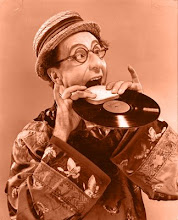Pat and Patachon on DVD
 After five years of digging up scraps of loose info and tracking down what little footage I could afford, I finally hit the Pat and Patachon motherlode; a seven DVD set from Kinowelt available from Amazon.de. The most complete P&P feature I had seen prior to this set was the turgid and sloppy Blinde Passagiere (1936), one of the six talking features the Danish comedy team made in Germany. As unpromising as Blinde Passagiere was, I found it unlikely to be representative of a team whose reputation rested on their silent output. So, in order to satisfy my ravenous curiosity, I plunked down my cash.
After five years of digging up scraps of loose info and tracking down what little footage I could afford, I finally hit the Pat and Patachon motherlode; a seven DVD set from Kinowelt available from Amazon.de. The most complete P&P feature I had seen prior to this set was the turgid and sloppy Blinde Passagiere (1936), one of the six talking features the Danish comedy team made in Germany. As unpromising as Blinde Passagiere was, I found it unlikely to be representative of a team whose reputation rested on their silent output. So, in order to satisfy my ravenous curiosity, I plunked down my cash.I REGRET NOTHING!!!!
The Kinowelt set features an early 80s German TV series of repackaged P&P films. Along with added sound effects and some rather pleasant Jacques Tati-esqe incidental music, a narrator who sounds a lot like Hans Albers provides color commentary and adds the occasional voice. The handling of the films is generally respectful and although a few episodes are features that have been cut down to fit the TV format, the editing covers for it. Oddly, even talking P&P films like Alf's Carpet (1929, their only English-language film, shot in the UK) have had their soundtracks replaced as though they were silents. I'd rather they hadn't, but pickers can't be choosers.
As for Pat and Patachon themselves, Blinde Passagiere is hardly representative. They were a silent team to their core, and Schenstrom and Madsen are excellent pantomime comics. Madsen gives every indication of having been a pantomime clown before entering films and I can imagine that neither he nor his partner were comfortable with sound (as their dialogue in Blinde Passagiere would indicate). As their very first shorts are included as well as some of their last features, this set gives a viewer the opportunity to see their characterizations develop. Although P&P debut as funny if unsympathetic tramps without much in the way of an inter-character dynamic, they quickly develop into the spiritual forefathers of Laurel and Hardy and Abbott and Costello. Schenstrom/Pat/the tall one is the "parent" figure who literally leads Madsen/Patachon around by the hand. Madsen's deadpan and slightly confused expression denotes a kind of uncaring stupidity in the earliest films but eventually evolves into the wide-eyed gaze of a (too) trusting child. When happy or amused, he'll suddenly burst into a wild, carefree dance, usually cut short by an irritated Pat. Schenstrom's performance as the devoted, yet dim and frequently selfish, friend stays consistent as does his appearance, hidden as it is behind a putty nose and brush mustache. They're subject to the standard needs of silent comics; food, alcohol, money, and women and will often fight over them, especially women. And there are a dozens and dozens of Danish girls in skimpy outfits playing precisely the same role here as the Sennett Bathing Beauties back in the US.
As for the films, some of them, especially the talkies, are plot-heavy and tedious and P&P appear as "support" for the inevitable Young Couple In Love. But there are a few gems in here. One features Patachon as a sharpshooting savant who uses the team's tiny apartment for target practice, sending bullets whizzing throughout the building. Another features a dream sequence in which P&P have all the flesh rendered from their bodies in a giant pot by scientists, leaving their heads intact atop skeletons (foreshadowing the ending of Laurel and Hardy's The Bullfighters). And even when the gags falls flat, some of their films must be among the most beautiful comedies ever made. The scenery, and the cinematography, is frequently breathtaking. Very few if any of their films appear to have been shot on sets, their regular director Lau Lauritzen opting to shoot the team in natural settings.
While Pat and Patachon are capable of some genuinely laugh-out-loud funny moments, such as their attempts to sell ice cream to skiers in the Swiss Alps or Patachon using his sharpshooting skills to spit out the fuse on an anarchist's bomb, I suppose it’s not terribly surprising that the team’s films never made headway in the US. The pacing of even their best pictures is, to my American tastes, a little sluggish and it was even considered an issue when a few of their silents were released in England (in re: to Ole Opfinder's Offer aka The Mill (1924), one contemporary English critic wrote "Its story is terribly slow and long-winded and suggests that Denmark's ideas of film comedy production are five years behind the times."). And although Pat and Patachon are probably not in line to be the next unsung silent comics about to receive their due, they and their films are testimonies to exactly how diverse the world of classic comedy is and how much remains to be discovered.
Labels: cinema, Pat and Patachon








1 Comments:
The narrator on the Pat & Patachon DVDs is Hanns-Dieter Huesch, a "Kabarettist", comedian, poet and songwriter who wrote a lot of political and social satire in the '70s and '80s. He died in the 1990s, I think.
Post a Comment
<< Home